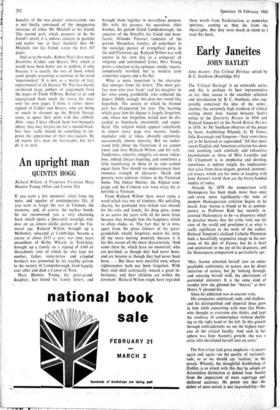An upright man
QUINTIN HOGG
Richard Wilton: A Forgotten Victorian Mary Ellamire Young (Allen and Unwin 35s) If you want a few moments' relief from the noise and squalor of contemporary life, if you want to forget the war in Vietnam, the economy, and, of course, the nuclear bomb, let me recommend you a very charming book which opens a pleasantly nostalgic win- dow on an almost idyllic picture of the Vic- torian age. Richard Wilton, brought up a Methodist, educated at Cambridge, became a curate at about £117 a year, was nine years incumbent of Kirby Wharfe in Yorkshire, brought up a family on a stipend of £160 or thereabouts (out of which he also kept his mother, father, sister-in-law and crippled brother), was promoted by his wealthy patron to the rectory of Londesborough, lived happily ever after and died a Canon of York.
Mary Blamire Young, his great-grand- daughter, has found his family letters, and brought them together to marvellous purpose. His wife, his parents, his querulous elder brother, his patron (Lord Londesborough, the ancestor of the Sitwells), his friend and bene- factor, Orlando Forester (ancestor of the present Shropshire family), all contribute to the nostalgic picture of evangelical piety in the mid-Victorian age. Richard Wilton was well known in his own day as a composer of religious and sentimental lyrics; Miss Young prints a selection in the epilogue, simple, sincere, competently versified, but to modern taste somewhat sugary and a bit flat.
What is more important is the character that emerges from the letters. 'The most per- fect man who ever lived,' said his daughter to her own young grandchild, who collected the papers. Oddly enough, this does not sound like hyperbole. The society of which he formed part has disappeared for ever. The learning which gave him his degree is largely forgotten, and, where not forgotten, would now be dis- carded as hopelessly unscientific and super- ficial. The religion which appears relentlessly in almost every page was narrow, funda- mentalist and, at times, absurdly optimistic, occasionally almost neurotic. But we under- stand little about the Victorians if we cannot know and love Richard Wilton and his wife. Tenderness, sincerity, integrity are never ridicu- lous, indeed always inspiring, and sometimes a little humiliating to those of us who cannot equal them. Nor should we underestimate their immense strength of character. Death and poverty were constant visitors in the Victorian home. The Indian Mutiny, the Afghan cam- paign and the Crimean war were every bit as horrible as Vietnam.
From Richard Wilton there never came a word which was not of kindness. His unfailing charity, his profound love (which was shared) for his wife and family, his deep piety, come to us across the years with all the more force because they brought him the happiness which so often eludes us. The fact that he is now, apart from the pious labours of his great- grandchild, wholly forgotten, makes his story all the more moving precisely because it is for this reason all the more characteristic. 'And some there be, which have no memorial; who are perished, as though they had never been; and are become as though they had never been born. . . . But these were merciful men, whose righteousness hath not been forgotten. With their seed shall continually remain a good in- heritance, and their children are within the covenant.' Richard Wilton might have regarded these words from Ecclesiasticus as somewhat 'spurious, coming as they do from the - Apocrypha. But they were much in mind 'as I read this book.


































 Previous page
Previous page